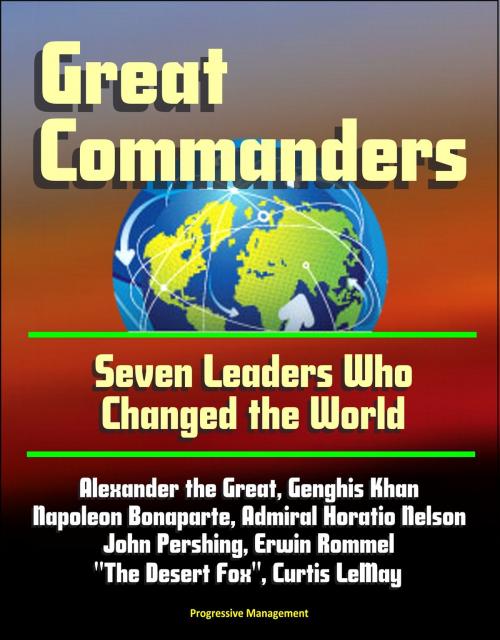Great Commanders: Seven Leaders Who Changed the World - Alexander the Great, Genghis Khan, Napoleon Bonaparte, Admiral Horatio Nelson, John Pershing, Erwin Rommel "The Desert Fox", Curtis LeMay
Nonfiction, History, Military, Strategy, World War II| Author: | Progressive Management | ISBN: | 9781310335587 |
| Publisher: | Progressive Management | Publication: | April 7, 2014 |
| Imprint: | Smashwords Edition | Language: | English |
| Author: | Progressive Management |
| ISBN: | 9781310335587 |
| Publisher: | Progressive Management |
| Publication: | April 7, 2014 |
| Imprint: | Smashwords Edition |
| Language: | English |
With the publication of Great Commanders, the Combat Studies Institute continues its mission of publishing exceptional scholarship and adding to the body of historical literature the thoughts and research of distinguished professors. These analyses are both interesting and useful in their discussion of what attributes and circumstances yield an extraordinary commander of martial forces. As the editors point out, this volume is not a study of the "greatest" commanders; rather, it is an examination of commanders who should be considered great. The seven leaders examined, in the various domains of ground, sea, and air, each in their own way successfully addressed the challenges of military endeavor in their time and changed the world in which they lived.
This volume begins with Alexander the Great, who wielded perhaps the finest army ever to wage war prior to the advent of gunpowder, and whose tactical and operational prowess bordered on genius. Next is Genghis Khan, who forged an effective political and military entity from the fractious horse-tribes of Asia and established through conquest one of the great empires in history. A remarkably enlightened and charismatic leader, Genghis Khan was also a superb strategist.
Napoleon Bonaparte, like Alexander and Genghis Khan, was possessed by a seemingly insatiable appetite for conquest. Napoleon also was born on the periphery of the world he came to dominate, rising from the minor nobility, ultimately to crown himself emperor. He harnessed the forces unleashed by the French Revolution, creating a military instrument that overthrew the status quo in Europe, and whose name has become synonymous with aggressive maneuver warfare and battles of annihilation. At its apogee, the Napoleonic empire encompassed virtually all of Europe—with the exception of the British Isles. The fact that Napoleon's empire terminated at the English Channel is due largely to the efforts of Horatio Nelson.
Nelson epitomized the art of naval warfare in the age of sail, and through audacity, tactical prowess, and personal leadership shaped the destiny of Europe. Something of a maverick within the venerable Royal Navy, Nelson belies the stereotype of naval commanders as cold and calculating technocrats rather than true leaders. His courage, both physical and moral, was at its greatest when the stakes were highest.
John J. Pershing represents a new breed of commander for the industrial age. He inaugurated the "American Century" by forging and leading the United States' first great expeditionary army—a hastily-raised army of amateurs led by a handful of professionals, flung headlong into the greatest war the world had ever seen. The product of a sleepy constabulary army, Pershing created a mass industrial-age army capable of holding its own among the great armies of Europe. Pershing himself sat at the highest seats of power as one of the arbiters in the fate of Europe.
Erwin Rommel, the consummate troop leader, practiced the tactical level of war in that conflict. With the advent of World War II, Rommel made the transition from infantry to armor, winning fame as one of the great practitioners of "blitzkrieg." Given an independent command, in a remote theater at the end of a tenuous supply line, Rommel cemented his reputation as a master of mechanized combined arms warfare.
Finally, Curtis LeMay represents air power for this collection of essays. A pioneer of military aviation, LeMay brought pre-nuclear strategic bombing to its apogee in an aerial campaign that epitomized "total" war in the 20th Century. He carried two burdens—the task of winning a war, and the challenge of establishing the credibility of strategic, independent air power. In what is perhaps the most technologically-oriented arena of warfare, LeMay demonstrated personal courage, shrewd decision-making, and inspirational leadership.
With the publication of Great Commanders, the Combat Studies Institute continues its mission of publishing exceptional scholarship and adding to the body of historical literature the thoughts and research of distinguished professors. These analyses are both interesting and useful in their discussion of what attributes and circumstances yield an extraordinary commander of martial forces. As the editors point out, this volume is not a study of the "greatest" commanders; rather, it is an examination of commanders who should be considered great. The seven leaders examined, in the various domains of ground, sea, and air, each in their own way successfully addressed the challenges of military endeavor in their time and changed the world in which they lived.
This volume begins with Alexander the Great, who wielded perhaps the finest army ever to wage war prior to the advent of gunpowder, and whose tactical and operational prowess bordered on genius. Next is Genghis Khan, who forged an effective political and military entity from the fractious horse-tribes of Asia and established through conquest one of the great empires in history. A remarkably enlightened and charismatic leader, Genghis Khan was also a superb strategist.
Napoleon Bonaparte, like Alexander and Genghis Khan, was possessed by a seemingly insatiable appetite for conquest. Napoleon also was born on the periphery of the world he came to dominate, rising from the minor nobility, ultimately to crown himself emperor. He harnessed the forces unleashed by the French Revolution, creating a military instrument that overthrew the status quo in Europe, and whose name has become synonymous with aggressive maneuver warfare and battles of annihilation. At its apogee, the Napoleonic empire encompassed virtually all of Europe—with the exception of the British Isles. The fact that Napoleon's empire terminated at the English Channel is due largely to the efforts of Horatio Nelson.
Nelson epitomized the art of naval warfare in the age of sail, and through audacity, tactical prowess, and personal leadership shaped the destiny of Europe. Something of a maverick within the venerable Royal Navy, Nelson belies the stereotype of naval commanders as cold and calculating technocrats rather than true leaders. His courage, both physical and moral, was at its greatest when the stakes were highest.
John J. Pershing represents a new breed of commander for the industrial age. He inaugurated the "American Century" by forging and leading the United States' first great expeditionary army—a hastily-raised army of amateurs led by a handful of professionals, flung headlong into the greatest war the world had ever seen. The product of a sleepy constabulary army, Pershing created a mass industrial-age army capable of holding its own among the great armies of Europe. Pershing himself sat at the highest seats of power as one of the arbiters in the fate of Europe.
Erwin Rommel, the consummate troop leader, practiced the tactical level of war in that conflict. With the advent of World War II, Rommel made the transition from infantry to armor, winning fame as one of the great practitioners of "blitzkrieg." Given an independent command, in a remote theater at the end of a tenuous supply line, Rommel cemented his reputation as a master of mechanized combined arms warfare.
Finally, Curtis LeMay represents air power for this collection of essays. A pioneer of military aviation, LeMay brought pre-nuclear strategic bombing to its apogee in an aerial campaign that epitomized "total" war in the 20th Century. He carried two burdens—the task of winning a war, and the challenge of establishing the credibility of strategic, independent air power. In what is perhaps the most technologically-oriented arena of warfare, LeMay demonstrated personal courage, shrewd decision-making, and inspirational leadership.















